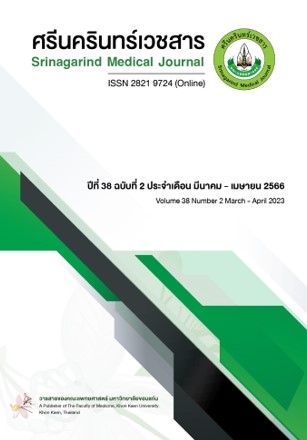Relationship of Dementia’s Caregiver Distress to the Mental State Examination and Neuropsychiatric Symptoms of Dementia Patients Somdejphrajaotaksinmaharaj Hospital: A Cross-Sectional Analytic Study
Keywords:
caregiver, distress, neuropsychiatric inventory for dementia (NPI)Abstract
Background and Objective: Caring for a dementia patient can become dementia caregiver distress including the caregiver’s mental health, family’s economics, and socialization of caregivers. The objective is to find a relationship between a dementia’s caregiver distress to the Thai mental state examination (TMSE) and the Neuropsychiatric inventory scale (NPI) of dementia patients
Methods: A cross-sectional analytic study in 73 dyads relationship of dementia caregivers and dementia patients in outpatient Somdejprajoataksinmaharaj Hospital. Collected data by surveying 1.A dementia caregiver about gender, age, patient relation, patient’s care duration, NPI, and Neuropsychiatric Inventory Distress scale (NPID) 2.A dementia patient about gender, age, type of dementia, the onset of dementia, and TMSE were analyzed in relation with multiple logistic regression.
Results: The TMSE of dementia patients is less than or equal to 16 points has an odd ratio of 5.04 (95% CI 1.4-17.5) and the NPI of dementia patients is more than 11 points has an odd ratio of 9.44 (95% CI 1.86-47.82) both were related to dementia’s caregiver distress.
Conclusions: Lower TMSE and higher NPI of dementia patients relate to dementia’s caregiver distress.
References
Eakplakarn W NW, Sornpisarn B. Thai national health examination survey, NHES V 2016;5:115-20.
Wangtongkum S, Sucharitkul P, Silprasert N, Inthrachak R. Prevalence of dementia among population age over 45 years in Chiang Mai, Thailand. J Med Assoc Thai 2008;91(11):1685-90.
Jamjan R MD, Ponphi S. Prevalence of neuropsychiatric symptoms in patients with dementia; a study in Chiangmai neurological hospital. J DMS 2018;43:96-100.
Cheng S-T. Dementia caregiver burden: a research update and critical analysis. Curr Psychiatry Rep 2017;19(9):64. doi.org/10.1007/s11920-017-0818-2
Pinyopornpanish M, Pinyopornpanish K, Soontornpun A, Tanprawate S, Nadsasarn A, Wongpakaran N, et al. Perceived stress and depressive symptoms not neuropsychiatric symptoms predict caregiver burden in Alzheimer's disease: a cross-sectional study. BMC Geriatr 2021;21(1):180. doi.org/10.1186/s12877-021-02136-7
Huang WC, Chang MC, Wang WF, Jhang KM. A comparison of caregiver burden for different types of dementia: an 18-month retrospective cohort study. Front Psychol 2022;12: 798315. doi: 10.3389/fpsyg.2021.798315. eCollection 2021.
Taeger D, Kuhnt S. Statistical hypothesis testing with sas and r. John Wiley & Sons, Chichester, 2014. 2014:51-64. doi.org/10.1002/9781118762585
Musa G, Henríquez F, Muñoz-Neira C, Delgado C, Lillo P, Slachevsky A. Utility of the neuropsychiatric inventory questionnaire (NPI-Q) in the assessment of a sample of patients with Alzheimer's disease in Chile. Dement Neuropsychol 2017;11(2):129-36. doi: 10.1590/1980-57642016dn11-020005.
Charernboon T. Reliability and validity of the thai version of the neuropsychiatric inventory (NPI-Thai): King College London; 2013.
Kuha A BP, N T. Comparative study of mini-mental sate examination Thai 2002 (MMSE-Thai 2002) and Thai-mental state examination (TMSE) in elderly screening test for cognitive impaitment. Nonbiri: Department of Medical Services,Ministry of Public Health; 2551.
Kabatova O, Putekova S, Martinkova J. Analysis of psychometric features of the mini-mental state examination and the montreal cognitive assessment methods. Clin Soc Work J 2016;7:62-9. doi.org/10.22359/cswhi_7_2_08
Torrisi M, De Cola MC, Marra A, De Luca R, Bramanti P, Calabrò RS. Neuropsychiatric symptoms in dementia may predict caregiver burden: a Sicilian exploratory study. Psychogeriatrics 2017;17(2):103-7. doi.org/10.1111/psyg.12197
Koovimon W, Dusitanond P. Surveys of behavioral and psychological symptoms of dementia (BPSD) in dementia patients. Thai J Neurol 2020;36:35-50.
Han G, Maruta M, Ikeda Y, Ishikawa T, Tanaka H, Koyama A, et al. Relationship between performance on the mini-mental state examination sub-items and activities of daily living in patients with alzheimer's disease. J Clin Med 2020;9(5):1537. doi: 10.3390/jcm9051537.
Fauth EB, Gibbons A. Which behavioral and psychological symptoms of dementia are the most problematic? variability by prevalence, intensity, distress ratings, and associations with caregiver depressive symptoms. Int J Geriatr Psychiatry 2014;29(3):263-71. doi.org/10.1002/gps.4002
Shikimoto R, Sado M, Ninomiya A, Yoshimura K, Ikeda B, Baba T, et al. Predictive factors associated with psychological distress of caregivers of people with dementia in Japan: a cross-sectional study. Int Psychogeriatr 2018;30(8):1089-98. doi.org/10.1017/S1041610217002289
Lu X, Ye R, Wu J, Rao D, Liao X. Comparing behavioral and psychological symptoms of dementia and caregiver distress caused between older adults with dementia living in the community and in nursing homes. Front Psychiatry 2022;13:881215. doi.org/10.3389/fpsyt.2022.881215
Shaji KS, George RK, Prince MJ, Jacob KS. Behavioral symptoms and caregiver burden in dementia. Indian J Psychiatry 2009;51(1):45-9. doi.org/10.4103/0019-5545.44905
Downloads
Published
How to Cite
Issue
Section
License
Copyright (c) 2023 Srinagarind Medical Journal

This work is licensed under a Creative Commons Attribution-NonCommercial-NoDerivatives 4.0 International License.




